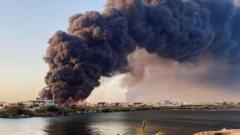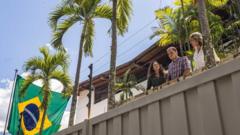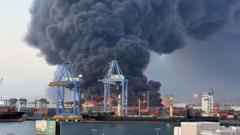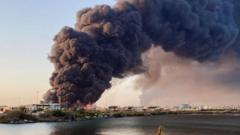The article details recent developments in northern Syria, focusing on the aftermath of the rebels' rapid successes and the obstacles they face ahead.
Rebels Face Rebuilding Challenge After Overthrowing Syrian Army

Rebels Face Rebuilding Challenge After Overthrowing Syrian Army
Following the quick military victories over Assad's forces, the rebels now confront the daunting task of reconstructing a war-torn nation.
More than 50 tanks and military vehicles lie scattered and abandoned in a northern Syrian army base, which has been seized by rebel forces in a swift offensive against President Bashar al-Assad's regime. The remnants of the base illustrate the collapse of the once-mighty Syrian military, as soldiers left behind a chaotic scene characterized by the absence of provisions and organization.
In just three days, the once secure city of Aleppo fell into rebel hands without much direct confrontation, leading Abu Muhammad, a rebel fighter, to recount that the Syrian soldiers retreated with surprising speed. The garrison, now under the control of the rebels, features desolate living conditions that include makeshift coverings in place of doors and windows, exposing the stark reality for those left behind in the chaos.
Despite their victory, the rebel factions' triumph brings with it significant challenges. Coordinating efforts among distinct groups that united against a common enemy hints at the potential for a newly established governance. However, transforming military success into civil stability proves much more complex. The decades of conflict have sowed deep societal rifts, dismantled infrastructure, and devastated the economy, making the task of national reconstruction monumental.
As rebel leaders survey the battlefield recovery, they recognize that killing soldiers is just the first step; building a functional nation from the rubble requires diplomacy, governance strategies, and resources — all of which are currently lacking amid a fractured political landscape. Moving forward, questions arise regarding administration structures, handling of former military personnel, and returning to normalcy for civilians, all while navigating the inherent risks of factional disputes that could undermine their gains.
Sustaining momentum and unity are crucial as the rebels chart their course ahead, balancing their immediate military objectives with the long-term vision of a peaceful, rebuilt Syria. The international community watches closely, awaiting indications on how these developments will affect regional stability and the likelihood of peace in a region fraught with historical animosities and ongoing crises.
In just three days, the once secure city of Aleppo fell into rebel hands without much direct confrontation, leading Abu Muhammad, a rebel fighter, to recount that the Syrian soldiers retreated with surprising speed. The garrison, now under the control of the rebels, features desolate living conditions that include makeshift coverings in place of doors and windows, exposing the stark reality for those left behind in the chaos.
Despite their victory, the rebel factions' triumph brings with it significant challenges. Coordinating efforts among distinct groups that united against a common enemy hints at the potential for a newly established governance. However, transforming military success into civil stability proves much more complex. The decades of conflict have sowed deep societal rifts, dismantled infrastructure, and devastated the economy, making the task of national reconstruction monumental.
As rebel leaders survey the battlefield recovery, they recognize that killing soldiers is just the first step; building a functional nation from the rubble requires diplomacy, governance strategies, and resources — all of which are currently lacking amid a fractured political landscape. Moving forward, questions arise regarding administration structures, handling of former military personnel, and returning to normalcy for civilians, all while navigating the inherent risks of factional disputes that could undermine their gains.
Sustaining momentum and unity are crucial as the rebels chart their course ahead, balancing their immediate military objectives with the long-term vision of a peaceful, rebuilt Syria. The international community watches closely, awaiting indications on how these developments will affect regional stability and the likelihood of peace in a region fraught with historical animosities and ongoing crises.





















